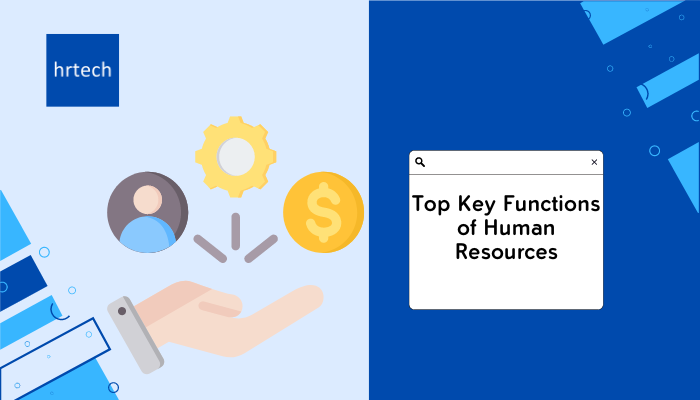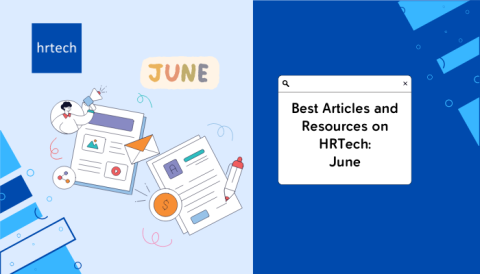Check out here the top 12 functions of HR and understand how they contribute to business success.
by Sriram Iyer, Founder & CEO, hrtech

The Human Resource department is a critical component of any organisation, as it is responsible for managing and optimising employee performance. Collaborating with an experienced HR consultant can help organisations better navigate challenges and implement strategies to enhance workforce management. With a multitude of responsibilities under its umbrella, the role of HR has evolved significantly over the years. It has expanded beyond just recruitment and employee relations and is playing a crucial role in employee engagement, development, and retention, among other things. Let’s take a look at the top 12 functions of HR and understand how they contribute to business success.
Top 12 Key Functions of HR
1. Human Resource Planning
The role of the HR planning function is to anticipate the future requirements of the organisation. This involves determining the number of resources the organisation will require. This knowledge will influence various HR activities, including recruitment, performance management, and employee learning.
The HR planning function typically includes activities like assessing the current workforce, forecasting future resource needs, identifying skill gaps, and developing, implementing and evaluating HR strategies.
2. Recruitment and Selection
The recruitment and selection function of HR involves the process of identifying, attracting, and hiring suitable candidates for job positions within an organisation. This function of HR typically involves several stages, including job analysis, sourcing, screening, testing, interviewing, and hiring.
Ensuring that the right candidates are in the right positions is critical for improving organisational success. As the average cost of a bad hire is up to 30% of the employee’s first-year earnings, the role of this function of the HR department becomes important in improving business outcomes.
3. Performance Management
As the name suggests, the performance management function of HR involves managing and improving employee performance within an organisation. The goal of this function of HR is to ensure that employees are working towards achieving organisational goals and objectives. Performance management helps in aligning employee performance with the overall business growth strategy.
69% of HR leaders believe that performance management will become more frequent in the near future as it proves to be instrumental in identifying and closing skill gaps in the current workforce and making them future-ready.
4. Learning and Development
The learning and development function of HR creates and implements strategies to enhance the skills, knowledge, and performance of the current workforce. This function of HR typically involves identifying the learning needs of employees, designing and delivering training programs that cater to those needs, and assessing the effectiveness of these programs. Upskilling, reskilling and cross-skilling of employees not only engages and motivates them but also opens up the possibilities for internal hiring for organisations.
5. Career Planning
The career planning function of HR helps employees identify their career goals and create a roadmap for achieving them. This function typically involves conducting career assessments, developing growth pathways, and providing employees with the necessary guidance, training resources and support to enhance their career growth chances. Employees are more likely to stay with an employer that offers them career growth opportunities.
6. Function Evaluation
Function evaluation is the process of assessing the effectiveness and efficiency of different HR functions. This process involves evaluating various aspects of HR activities, including recruitment, compensation, benefits, employee relations, and employee training. Function evaluation guarantees that the company achieves success at a strategic level and with service delivery and support.
7. Rewards
The rewards function of HR pertains to the process of designing, implementing, and managing compensation and benefits programs for employees. This includes determining bonuses, incentives, and other perks that are intended to motivate and retain employees. The rewards function is a crucial aspect of HR as it can impact employee morale, job satisfaction, and ultimately, business outcomes.
Elements of Rewards Function:
Employee development; Base pay; Recognition; Well-being; Job satisfaction; Bonuses & Incentives; Employee benefit programs; Credible leadership.
8. Industrial Relations
The industrial relations function of HR is in place to ensure compliance with employment laws and regulations, address employee grievances and disputes, and promote fair and equitable treatment of all employees. This function looks after the management of the relationship between employers and employees in the workplace and focuses on building a positive work environment through effective communication, negotiation, and conflict resolution.
9. Employee Participation and Communication
The Employee Participation and Communication function of the HR department is responsible for fostering effective communication channels between the employer and employees, and encouraging employee participation in decision-making processes. This function values employee inputs and increases their sense of belonging to improve employee morale, job satisfaction, and engagement.
10. Health and Safety
The health and safety function of HR ensures that the workplace is safe for all employees. It promotes a healthy and risk-free work environment for the workforce. This function includes developing and implementing policies and procedures to prevent accidents, promoting a culture of safety, and complying with relevant health and safety regulations.
The health and safety function is essential because it safeguards the health and well-being of employees, reduces the likelihood of workplace injuries to employees, and minimizes the risk of costly legal claims.
11. Personal Well-being
The employee well-being function of HR is focused on promoting the mental, emotional, financial and physical well-being of the workforce. This function works on the principle that employees who feel supported and valued by their employer are more likely to be productive and engaged at work. With 81% of employees feeling at risk of burnout and 51% of workers worldwide worried about their financial well-being, a focus on employee well-being has become a major concern for HR leaders.
12. Administrative Responsibilities
The HR function is responsible for creating, maintaining, and updating employee records, including personal and professional details, performance evaluations, compensation, and benefits. Moreover, the function looks after administrating payroll, handling employee grievances and ensuring legal compliance with all relevant employment laws and regulations, such as discrimination laws and workplace safety regulations.
Conclusion
The function of HR is multifaceted. It serves as a crucial component for companies to optimise their workforce. HR professionals require a broad range of skills to effectively execute core HR functions. By effectively managing these functions, the HR department can help organisations attract and retain top talent, improve productivity, reduce costs, and enhance business outcomes.
About the Author:

Sriram Iyer is the founder & CEO of hrtech, a Singapore- headquartered #hrtech market development and analyst firm. A Human Resources practitioner with over two decades of experience, he is also a Certified Strengths Coach and a passionate #hrtech advocate. In his career, he has played leadership roles with the Singtel Group Enterprise and Nasdaq-listed Cognizant Technology Solutions.





